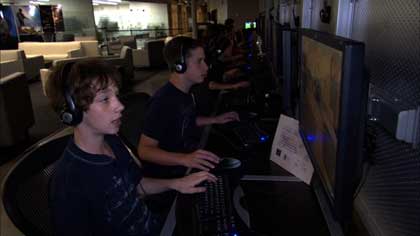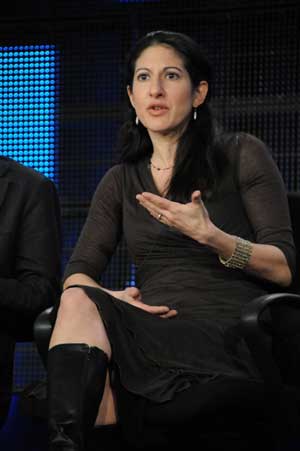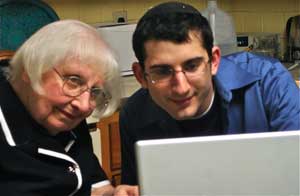[Bianculli here: Tuesday's edition of the PBS series Frontline looks at the impact of the Internet and digital media. Contributing writer Tom Brinkmoeller looks at it, too -- by not only previewing the program, but interviewing its producer...]

The Digital Revolution: Good for Home Cooking, Bad for 'Moby-Dick'
Some images from Tuesday's Frontline (9 p.m. ET, PBS; check local listings), called Digital Nation: Life on the Virtual Frontier, that probably will stick in the minds of many who watch it:
Young South Korean teens who hang out for hours, sometimes days, at the country's computer parlors to play virtual-reality games -- and the camps that have developed in that country to detox those young people from game addiction;
Under-draft-age kids spending lots of time and not a penny at the Army's $13 million, 12,000-square foot Army Experience Center recruitment facility in Philadelphia, where simulation lets them play in fantasy war conditions in which they can kill aplenty with no risk of getting hurt;
The truly eerie sight of a largely vacant IBM park of office buildings in Westchester, N.Y., where technology, not the economy, has emptied the offices -- so many employees telecommute that one has to wonder how much all of this unused real estate is pulling down IBM's ledger.
The Frontline program is almost overloaded with information about what the massive changes in technology over the last decade or so have done to the "natives" who were born into it and the "immigrants" who have to stretch farthest to adapt. Experts speak about, and examples point to, the good and the bad effects of this digital nation.
Two schools, one in the Bronx and one in New Jersey, have bought into the revolution and administrators are more than enthusiastic about the wonderful results. MIT students, who are nonstop-wired to handhelds and laptops, talk about the ease with which they multitask during almost every minute of their non-sleeping lives.
Equally comfortable with the changes is an Army officer connected with the Philadelphia endeavor who explains, "Here in the Army Experience Center . . . video games are never going to replicate the real thing. But it is a sampling experience to pique your interest and maybe. . . encourage you to go learn more, just as Apple is trying to do" (in its retail stores).
From the other side, a researcher's tests reveal the way multitasking slows the brain and the UCLA author of a "Brain on Google" study uses the word "addiction" to describe the conditions. An English professor tells how it's now not possible to assign a book that's longer than 200 pages and another academic says those who proudly claim citizenship in this new digital nation "have done themselves a disservice by drinking the Kool-Aid."
Is what's happening good or bad?

Viewers looking for a verdict won't find one. Rachel Dretzin, who produced this as well as a 2008 Frontline look into tech effects, Growing Up Online, said she gauges the success of her efforts by their ability to cause people "to turn off the television set and argue about it for an hour. I want them to talk about it.
"It's neither a thumbs-up or a thumbs-down," she said. "It's way too complex to come to a conclusion like that."
By generating conversation, she said, people can better examine the issue to uncover the good and scary parts of what has and is happening in the digital world growing around us: to point out "what it is that's important, that we don't want to lose."
She said the digital shift "is as big as literacy," and it's the responsibility of "the last generation who remember a non-digital world . . .to tell (those who follow) what they may not know."
But it may be difficult to function as a herald of a cultural heritage, Dretzin points out, when the the would-be messengers "are wrestling with and dealing with (these changes)" at the same time. Anyone familiar with the carefully stodgy image IBM built for itself during the 20th century can only wonder what kind of shifts people who worked under that former paradigm must have had to make.
The program also shows Air Force personnel who, stationed at a Nevada base, pilot drone aircraft over targets thousands of miles away. Drone-mounted cameras relay images of people and objects to screens, and when the images are targets, the pilots fire on and destroy them. When their shifts end, these same pilots drive home to have dinner with their families.

The program also offers a fun example of a "native" helping an "immigrant" find her way through the Digital Nation. Bayla "Bubbe" Sher, 83, worked for a bank until she was 73. Today, thanks to the savvy and collaboration of her grandson, she hosts a popular Jewish cooking show on the Web, Feed Me Bubbe, from her home kitchen. Watch it by clicking HERE.
The grandson, Avrom Honig, talked proudly of his grandmother's adaption to change: "The Internet, really, I have to say, it added years to Bubbe's life."
But even in a digital revolution, an old weapon can pack considerable punch.
"They grew up with it." said Sher. "To them it's like second nature. And it's easier for my grandchildren to go into e-mail -- I get angry at them sometimes, I say I'd like to hear your voice! I know you e-mail, and they sit down and type you out a little e-mail, and it's wonderful. But call me on the telephone."
--

Tom Brinkmoeller notes that the aphorism "The more things change, the more they stay the same" was written in the middle of the 19th century, making it even older than CompuServe.